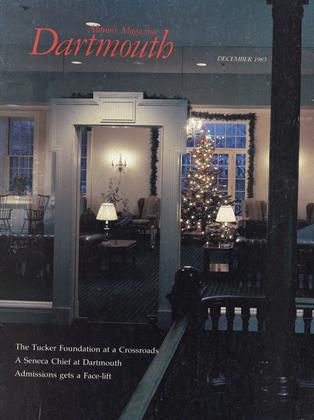One hundred years ago the volcano Krakatau in the Dutch East Indies (now Indonesia) erupted in a series of violent explosions which distributed volcanic dust around the world. This year the Indonesian Institute of Sciences celebrated the hundredth anniversary of this event with a symposium in Jakarta to discuss scientific investigations by Indonesians and others on the eruption and its effect on the surroundings. Three Dartmouth earth scientists were there for the symposium. The Joe Obering '55 Fund enabled two of the earth science faculty active in volcano logical research Richard E. Stoiber '32 and Stanley N. Williams (A.M. '80, Ph.D. '83) to travel from Hanover to Jakarta. A recent Dartmouth earth science graduate student, Chris Newhall (Ph.D. '80), now a volcanologist with the United States Geological Survey, was also at the symposium.
Stoiber and Williams reported on their recent Krakatau research. They had studied, by a novel method, the gases evolved during this explosive eruption 100 years ago. Their approach was to locate samples of volcanic ash collected at the time which had never been rained on. Samples were found in museums in the United States, Britain, and Holland. They were washed with distilled water and the washwater was analyzed for sulfur and chlorine, both important constituents of volcanic gas. From the investigation it was found that the eruption of Krakatau released at least seven million tons of sulfur into the atmosphere and more chlorine than any other known eruption. These chemicals are now believed to be more important than the volcanic ash in their potential for climatic impact.
It was just thirty years ago that Robert Decker, former professor of earth sciences at Dartmouth, taught some of the present leaders in earth sciences at the Bandung Technical Institute in Indonesia while on sabbatical leave from the College.
Robert A. Danziger '56, AlumniCouncil Trustee nominee.
 View Full Issue
View Full Issue
More From This Issue
-
 Feature
FeaturePsycho-Social Dynamics and the Prospects for Mankind
December 1983 By Charles E. Osgood '39 -
 Feature
FeatureMaris Bryant Pierce: A Seneca Chief at Dartmouth
December 1983 By Howard A. Vernon -
 Cover Story
Cover StoryCROSSROADS
December 1983 By Shelby Grantham -
 Feature
FeatureOn a Scale of 1 to 10...
December 1983 By Brad Hills '65 -
 Feature
FeatureAdmissions gets a Face-lift
December 1983 By Nancy Wasserman -
 Sports
SportsSports
December 1983 By Kathy Slattery
Article
-
 Article
ArticleGripsholm Alumni Club
December 1942 -
 Article
Article183rd Commencement To Take Place June 8
May 1952 -
 Article
ArticleThree Prominent Members of the Hanover Dog Pack
December 1953 -
 Article
ArticleWith Big Green Teams
October 1955 -
 Article
Article1996
MAY | JUNE 2016 By —Garrett Gil de Rubio -
 Article
ArticleGRADUS AD PARNASSUM
October 1939 By The Editor

